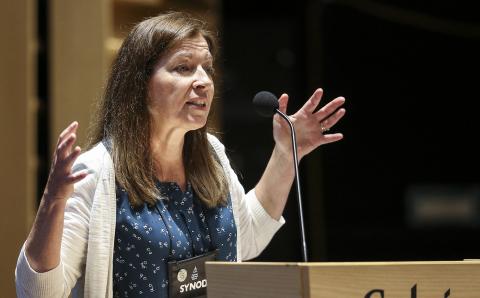Synod 2022, in declaring the church's historic stance on same-sex relationships as having confessional status, closed the door on a local option for congregations to determine how God calls individuals to live chaste lives in response to God's grace. What does that mean for members, pastors, and congregations who have been moving in a different direction?
Synod is the general assembly of the Christian Reformed Church. At its meeting June 10-16 it received the anticipated human sexuality report, requested by Synod 2016 to “provide concise yet clear ethical guidance for what constitutes a holy and healthy Christian sexual life, and in light of this to serve the church with pastoral, ecclesial, and missional guidance that explains how the gospel provides redemptive affirmation and hope for those experiencing sexual questioning, temptation, and sin” (Acts of Synod 2016). Synod 2022 adopted most of the report’s recommendations and took the unprecedented action of declaring its conclusions to be an interpretation of a confessional standard of the church, giving the interpretation itself “confessional status” and therefore binding on those who hold church office, and on all confessing members. What now? How will this decision play out?
The synod ruling was directed to Heidelberg Catechism question and answer 108, which asks, “What is God’s will for us in the seventh commandment?” (“You shall not commit adultery,” Ex. 20:14 and Deut. 5:18.) The catechism answers its question by saying, in part, “God condemns all unchastity.” The question before Synod 2022 was what is understood to be included under “unchastity”? Synod declared that the term “encompasses adultery, premarital sex, extra-marital sex, polyamory, pornography, and homosexual sex”—and that, therefore, this interpretation has the status of the catechism itself—confessional status.
Confessional teachings must be upheld by all who hold office in the church, including clergy, professors at denominational schools, elders, and deacons. Those who publicly speak against a confessional teaching may be disciplined, including suspension or removal from office.
Previously, since 1973, the CRC’s position on homosexual sex (that the desire for someone of the same sex is not in itself sinful but that same-sex sexual acts are) had the status of a synodical decision. One can publicly disagree with a decision of synod, but Synod 2022’s decision took it further. Officebearers of the church can no longer publicly disagree with it.
This raises a host of questions.
Gravamen: how to disagree with a confession
The first questions are for those who have already publicly disagreed with the action taken by Synod 2022. If the synodical ruling now has confessional status, can they continue in church office? And if so, what can they now say and not say?
Asked about this in the discussion at Synod 2022, the reporter for the committee charged with presenting the human sexuality report to synod, Doug Fakkema, Classis Pacific Northwest, said, “We have a process. We should trust the church order.”
In an interview with The Banner, Fakkema reiterated this advice from the church order, noting that the church order provides ways to disagree with a confession of the church.
In the church order (in the supplement to Article 5, starting on page 14) a dissent from the confessions is called a “gravamen.” They are in two categories: confessional-difficulty, a personal concern of an officebearer that is to be judged by the church council and possibly the classis (regional group of churches), and confessional-revision, a formal request for the church to revise its confessions. That type of gravamen in the history of the Christian Reformed Church is exceedingly rare. Henry DeMoor, retired professor of church order at Calvin Theological Seminary, could think of only two. He noted that the church is not set up to handle large numbers of gravamina (plural of gravamen). He said it would likely “lead to significant chaos.” In DeMoor’s opinion, by its action “synod has squandered the unity of the church and damaged its mission.”
The first type of gravamen, though, begins with one’s own council, and councils frequently handle dissents from confessional teachings informally.
Fakkema said that in his own experience as a pastor, confessional disagreements, often about infant baptism, have usually been handled internally by the council. The person who disagrees with the church’s teachings, say, a prospective elder or deacon, informs the council of the disagreement, and the council takes note of it but allows the elder or deacon to continue to serve.
The church order supplement that describes what to do with a confessional-difficulty gravamen suggests that if a council is unable to make a judgment, it could go to the next assembly (classis) and after that to synod if a judgment still can’t be made. the gravamen submitted to it, it shall submit the matter to classis for examination and judgment, but it’s clear that “this type of gravamen should be dealt with pastorally and personally by the assembly addressed.”
Would this kind of process continue in light of the Synod 2022 decision? And what guidance will the institutions of the church give for those affected?
Institutional Guidance
Contacted by The Banner, both Calvin University and the Office of General Secretary of the Christian Reformed Church said they were working on it, bringing together groups to formulate guidance for those affected by the synod decision.
Calvin University provost Noah Toly said in an email that “moments like these may prompt some to wonder whether this is a place where they can continue to pursue their scholarly vocations.” But, he said, “for many decades, Calvin has been a place where (confessional fidelity and academic freedom) have sharpened each other.”
Toly affirmed Calvin’s commitment to LGBTQ+ students and colleagues: “The church teaches that they, no less than others, should receive ‘loving support and encouragement’ as they live out their calling as Christ’s disciples.”
Calvin has asked its board of trustees to form a task force “in order to better grasp the implications of Synod’s decisions.”
Zachary King, appointed general secretary of the CRC by Synod 2022, in answer to an inquiry from The Banner, said his office is “ developing guidance for CRC classes, congregations, institutions, agencies, and staff members regarding Synod 2022's decisions about human sexuality.”
In a separate communiqué to pastors, King said, “I also know that many are wondering, ‘what now’ in terms of how to apply (the synodical) decisions in our local contexts,” but assured pastors and councils that he is “consulting with staff and church order experts to answer those questions with integrity and grace.”
Responding in the context of local congregations
In the meantime, after a contentious synod, the delegates have gone home. Lynette van de Hoef Meyers, Classis Ontario Southwest, is the pastor of Good News CRC in London, Ont. She was the reporter for five delegates who dissented from the recommendations of the synodical committee that presented the material on human sexuality to the synod.
Asked by The Banner about how the decisions of synod will affect her, she said it is too early to know. For now, she said, it’s time to go back to work. “We have a church to run; people to love,” she said. “We are going to have a conversation (in our congregation), but I don’t want us to make rash decisions.” She added, “It’s summertime.”
Van de Hoef Meyers expressed her trust in God. She said that at times post-synod, it does sometimes feel dark, “but God works incredible things in the dark. I’m curious to see what God is doing.”
Larry Louters checks several boxes for people who are likely to be directly affected by the actions of synod on human sexuality. He was a delegate from Classis Grand Rapids East, the classis for which synod has appointed an oversight committee (committee in loco) for previous actions not in line with the CRC’s position on homosexuality. He is also the chair of the council at Neland Avenue CRC, a church that has elected as a deacon a woman in a same-sex marriage. And he is a chemistry professor at Calvin University. He was at the center of the controversial ending of the debate at Synod 2022 on the status of Neland Avenue Church.
Louters told The Banner that post-synod he has attended many meetings wrestling with the “what now” question. “There is enough unknown,” he said, “that no one knows what the actual implications are.”
But Louters, like van de Hoef Meyers, has also been counseling patience, allowing events to play out. He said, speaking for his classis: “Grand Rapids East loves the CRC; we need to learn to live with the tension (between those in the denomination on different sides of the issues).” He said, “We need to live with uncertainty.” That uncertainty will continue. At a June 27 council meeting Louters said the Neland Avenue council unanimously adopted this statement:
“We take the admonition of Synod 2022 very seriously. We understand that delegates labored over this decision, and that it was done out of a sincere belief of many that they were doing the right thing. However, as we prayed, wrestled with the Word, and discerned the Spirit together, our conscience told us that we would be both disobedient to God’s call, and less than fully loving to all His children if we ‘immediately rescinded’ our decision to ordain this deacon.
“After prayerful consideration of the directives of Synod 2022, we have decided to appeal its decisions. We also welcome the appointed synodical ‘committee in loco’ to visit and discuss this decision with us at a future full Council meeting. Our next scheduled meeting is in August.”
About the Authors
Alissa Vernon is the news editor for The Banner.
Clayton Libolt was the long time pastor of River Terrace Church in East Lansing, Mich. Since his retirement, he has served in a variety of interim positions. He is presently serving as the interim senior pastor of Sonlight Community CRC in Lynden, Wash.








